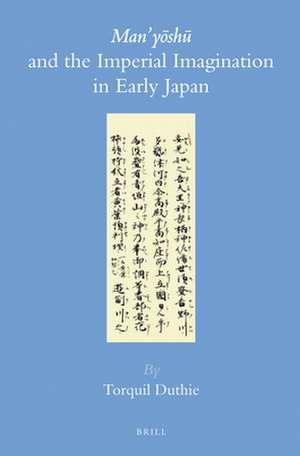<i>Man’yōshū</i> and the Imperial Imagination in Early Japan: Brill's Japanese Studies Library, cartea 45
Autor Torquil Duthieen Limba Engleză Hardback – 8 ian 2014
Din seria Brill's Japanese Studies Library
- 18%
 Preț: 1354.48 lei
Preț: 1354.48 lei - 18%
 Preț: 710.18 lei
Preț: 710.18 lei - 18%
 Preț: 703.79 lei
Preț: 703.79 lei - 18%
 Preț: 788.24 lei
Preț: 788.24 lei - 15%
 Preț: 467.75 lei
Preț: 467.75 lei - 15%
 Preț: 536.80 lei
Preț: 536.80 lei - 18%
 Preț: 901.45 lei
Preț: 901.45 lei - 18%
 Preț: 832.24 lei
Preț: 832.24 lei - 18%
 Preț: 857.69 lei
Preț: 857.69 lei - 18%
 Preț: 643.29 lei
Preț: 643.29 lei - 18%
 Preț: 722.15 lei
Preț: 722.15 lei - 15%
 Preț: 495.69 lei
Preț: 495.69 lei - 15%
 Preț: 423.79 lei
Preț: 423.79 lei - 18%
 Preț: 722.06 lei
Preț: 722.06 lei - 18%
 Preț: 1000.90 lei
Preț: 1000.90 lei - 18%
 Preț: 547.05 lei
Preț: 547.05 lei - 18%
 Preț: 726.71 lei
Preț: 726.71 lei - 18%
 Preț: 801.57 lei
Preț: 801.57 lei - 18%
 Preț: 672.63 lei
Preț: 672.63 lei - 18%
 Preț: 674.50 lei
Preț: 674.50 lei - 18%
 Preț: 865.56 lei
Preț: 865.56 lei - 18%
 Preț: 1130.85 lei
Preț: 1130.85 lei - 18%
 Preț: 610.09 lei
Preț: 610.09 lei - 18%
 Preț: 587.97 lei
Preț: 587.97 lei - 18%
 Preț: 867.87 lei
Preț: 867.87 lei - 18%
 Preț: 716.50 lei
Preț: 716.50 lei - 18%
 Preț: 715.65 lei
Preț: 715.65 lei - 18%
 Preț: 646.44 lei
Preț: 646.44 lei - 18%
 Preț: 1041.66 lei
Preț: 1041.66 lei - 18%
 Preț: 866.63 lei
Preț: 866.63 lei - 18%
 Preț: 606.36 lei
Preț: 606.36 lei - 18%
 Preț: 686.39 lei
Preț: 686.39 lei - 18%
 Preț: 621.35 lei
Preț: 621.35 lei - 18%
 Preț: 730.79 lei
Preț: 730.79 lei - 18%
 Preț: 725.17 lei
Preț: 725.17 lei - 18%
 Preț: 682.23 lei
Preț: 682.23 lei - 18%
 Preț: 916.89 lei
Preț: 916.89 lei - 18%
 Preț: 778.32 lei
Preț: 778.32 lei - 18%
 Preț: 1260.33 lei
Preț: 1260.33 lei - 18%
 Preț: 731.65 lei
Preț: 731.65 lei - 18%
 Preț: 704.54 lei
Preț: 704.54 lei - 18%
 Preț: 674.50 lei
Preț: 674.50 lei -
 Preț: 344.93 lei
Preț: 344.93 lei - 18%
 Preț: 552.50 lei
Preț: 552.50 lei - 18%
 Preț: 547.19 lei
Preț: 547.19 lei - 18%
 Preț: 548.19 lei
Preț: 548.19 lei - 18%
 Preț: 602.72 lei
Preț: 602.72 lei - 47%
 Preț: 629.00 lei
Preț: 629.00 lei - 18%
 Preț: 544.69 lei
Preț: 544.69 lei
Preț: 384.53 lei
Nou
Puncte Express: 577
Preț estimativ în valută:
73.60€ • 79.98$ • 61.87£
73.60€ • 79.98$ • 61.87£
Carte indisponibilă temporar
Doresc să fiu notificat când acest titlu va fi disponibil:
Se trimite...
Preluare comenzi: 021 569.72.76
Specificații
ISBN-13: 9789004251717
ISBN-10: 9004251715
Pagini: 444
Dimensiuni: 155 x 235 x 30 mm
Greutate: 0.84 kg
Editura: Brill
Colecția Brill
Seria Brill's Japanese Studies Library
ISBN-10: 9004251715
Pagini: 444
Dimensiuni: 155 x 235 x 30 mm
Greutate: 0.84 kg
Editura: Brill
Colecția Brill
Seria Brill's Japanese Studies Library
Notă biografică
Torquil Duthie, Ph.D. (2005), Columbia University, is Assistant professor of premodern Japanese literature at UCLA. He is the author of articles on early Japanese poetry and historiography, and of translations of the Man’yōshū into English and the Kokinshū into Spanish.
Recenzii
"The many observations this book affords have the potential to enlarge our understanding of early Japan far beyond the seventh century that is its ostensible focus. […] Considerations of space make it impossible to do full justice to the wealth of issues, information, and insights that this extensively researched and erudite study has to offer. […] this book is a most welcome and important contribution to the burgeoning field of English-language scholarship on early Japan."
Gustav Heldt in Japan Review Nr. 28 (2015), pp. 258-260.
Gustav Heldt in Japan Review Nr. 28 (2015), pp. 258-260.
